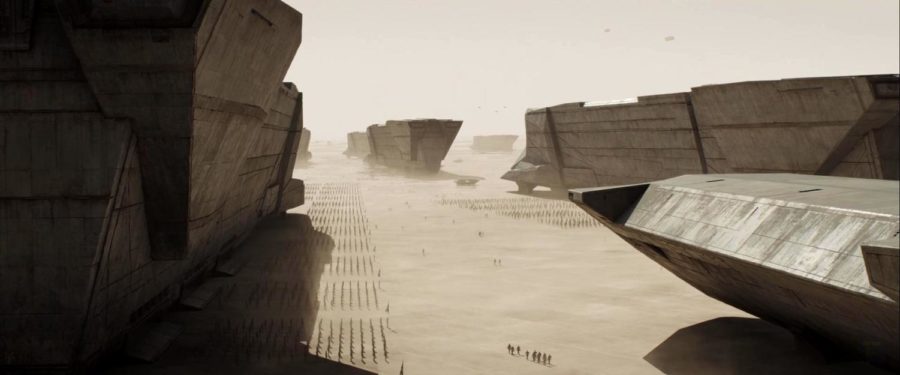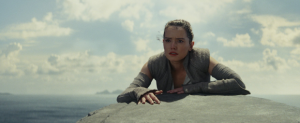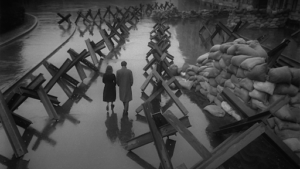You should support ‘Dune’ (2021), even if it could’ve been better
“Dune” is a flawed movie that deserves the world
An armada of hulking space ships gathers on the sand planet Arrakis in “Dune”.
November 10, 2021
Denis Villeneuve’s “Dune” is an intensely frustrating film. It sets itself apart from the common remake-sequel-reboot-sidequel trash which you see nowadays by actually being an accomplished director’s passion project, and it shows. There’s an immense amount of time and effort that’s been put into the staging and production of each of the portentous film’s many set pieces, and there’s absolutely an artistry in the way the entire film has been assembled. I hope that this film’s success is a good omen for the future of intelligent, artist-driven sci-fi that can stand in opposition to the hoard of big-budget drudgery coming out right now. With that said, I think “Dune” is still a deeply flawed film based on a middling book, and I can’t keep it from criticism just because I like what it represents.
Before I can really talk about what bugs me about the film, though, I have to talk about the book. I am aware that people love “Dune” (1965). I understand people’s admiration of the detailed world building and interplanetary politics, but I just can’t get past how uninteresting Frank Herbert is as a storyteller. While there are occasional moments of intense beauty, particularly during the book’s flirtations with action and transcendentalism, most of the novel is dull as bricks. Each character is simultaneously overdeveloped and uninteresting. This is made even more frustrating when almost the entirety of the book—especially the first half—consists of two characters talking in a room for entire chapters on end. This isn’t to say that devoting an entire chapter to a conversation is an inherently bad thing, but when your characters have as little to say as the lifeless husks which inhabit “Dune”, it creates an excruciating reading experience like no other. No character exemplifies Herbert’s complete ineptitude at characterization like the protagonist Paul, who is treated like he’s the smartest and most competent person in the room at all times, but never seems to actually know what’s going on. (Half of his lines are questions that serve only to inspire expository monologues from other characters.)
With all this said, “Dune” the movie is not nearly as frustrating as “Dune” the book. In fact, many of the reasons “Dune” is good stem from how it deviates from the source material. For one, the pace of the film is blisteringly fast compared to the book. I’ve heard some people complain that the movie is a slow burn, but they clearly haven’t read the source material. Each conversation is economical in its pacing, and the world building is far more efficient. While the book would take pages on end for a character to explain every single concept to the reader, the film does much of its explaining through natural, quick exposition or action. Whatever isn’t explained stays a mystery, which is honestly for the best to maintain good pacing and tone. Paul is also far stronger in the movie than he was in the book. Instead of being a lifeless husk with infinite wisdom, Paul is kind of angsty and doesn’t acclimate to his powers nearly as quickly as his written counterpart does. Movie Paul also has the distinct advantage of being performed by the talented Timothée Chalamet, who infuses Paul with the human relatability that he lacks in the book.
Unfortunately, even considering all the places that “Dune” improves on its source material, I still feel that it’s severely lacking in many areas. For one, while the film’s pace is better than that of the book, it still feels simultaneously too long and too short. On one hand, it feels too long predominantly because of where it decides to stop. Even though the logical conclusion for a “Part 1” of “Dune” would be on a dour note, the film seems dead set that it doesn’t (presumably because Villeneuve didn’t know whether this movie would get a sequel). This means that the movie keeps going for what I feel is about half an hour too long. However, I still feel this movie is too short, because it gets through all the material it has to cover so fast that barely any character, apart from Paul, gets development. This also means that a lot of important information is just glossed over, like the presence of a traitor among the royal Atreides family. As a result, the traitor’s ultimate reveal is more confusing than anything.
While this might get me killed, I also wasn’t impressed with the presentation. Don’t get me wrong, there are some marvelous aspects to the production, especially with the visual effects and production design, which are some of the best of the past ten years. With that said, I think the color, lighting, and sound editing leave something to be desired. The color and lighting are, in most cases, too muted for their own good. The desert is so pale that it almost looks like it hasn’t gone through principal color correction, and the night time scenes are often dark to the point of confusion. I think this problem can be attributed to the film’s cinematographer, Greig Fraser. Fraser’s most popular project before this was “Rogue One” (2016), which also, unfortunately, suffers from an overly muted color palette. Villeneuve is clearly capable of crafting some mesmerizing visuals with the right assistance, considering how his work with Roger Deakins is some of the best ever put to film, but Fraser just wasn’t right for this project.
The sound editing is less of an issue, but definitely needs to be mentioned. Hans Zimmer crafted an excellent score for this movie, utilizing sounds which create an aural landscape just as alien as the visual one, but it’s just so overbearing. I don’t know if there’s a single scene in this movie without music, which lessens the score’s impact. By the end of the film, I was actively chuckling whenever a slight hand gesture was met with a loud chant in the background.
As much as I have harped on this movie in this review, I still give “Dune” a glowing recommendation. It is, despite its flaws, still an incredibly impressive film to behold, especially in a theater, and it’s really quite inspiring to see a filmmaker making a big budget sci-fi epic for adults in the way he wants to make it. The film, much like the book, has moments of indescribable beauty, and those alone are enough for me to recommend you go see it in a theater. If you’re a fan of the book—or even if you aren’t—go give this movie your money. As consumers, we need to show big companies that we support the efforts of actual artists who want to make real movies, because that’s the only way that we can make sure that they continue to get opportunities in a market dominated by schlock.









